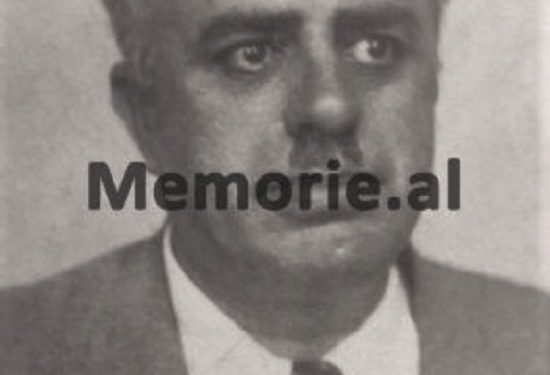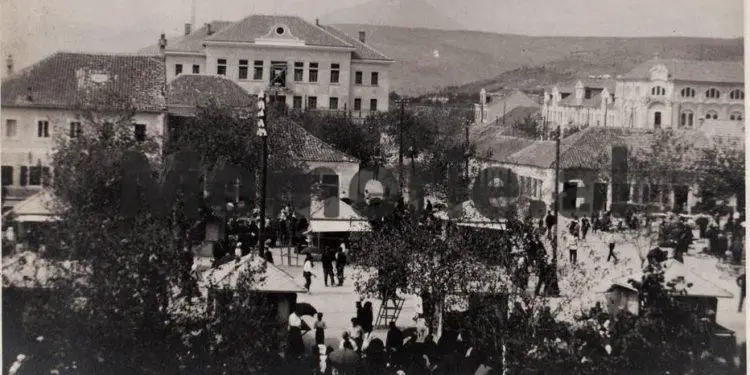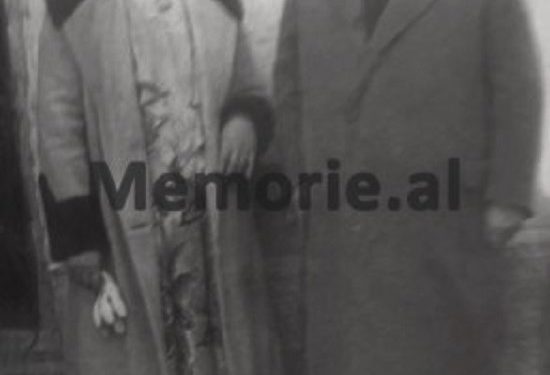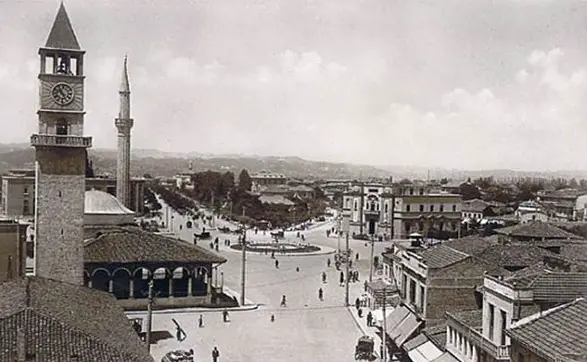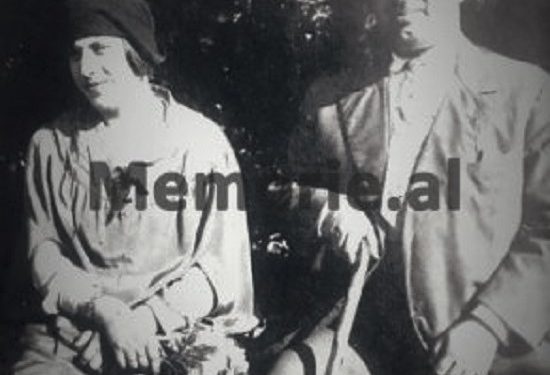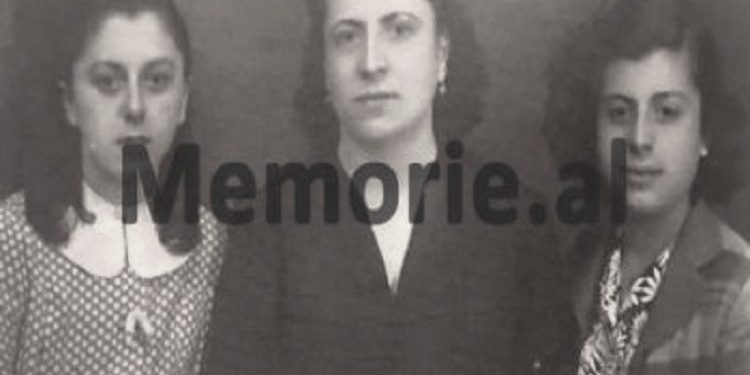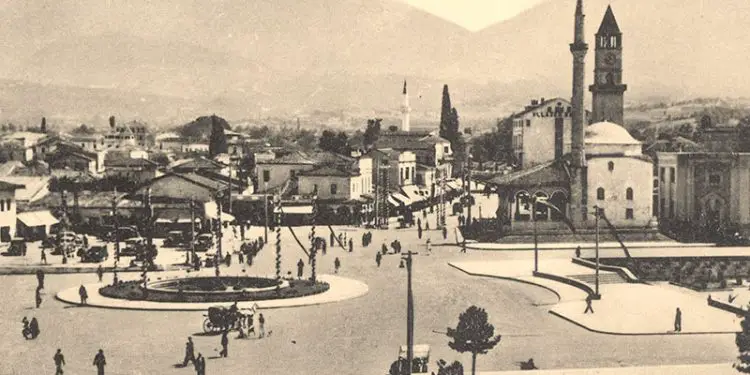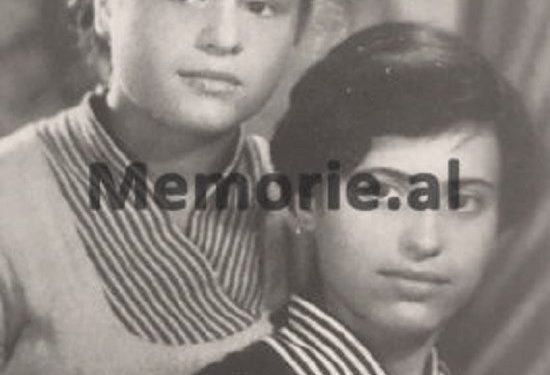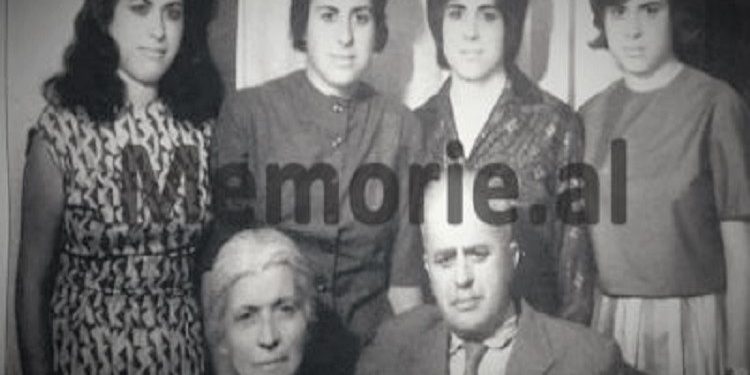Dashnor Kaloçi
Memorie.al publishes the unknown story of a prominent Tirana lawyer. Jonuz Tafaj, who after having been educated in Thessaloniki, Istanbul, and Naples, where he engaged with some of the most prominent Renaissance patriots on the national cause, returned to Albania and from the period of the Zog Monarchy until the end of November of the year. In 1944, he worked as a notary but was arrested by the Communists even though he had helped the Anti-Fascist Movement by sheltering Communists in his studio during the War. Charges against Jonuz for sheltering the former Commander-in-Chief of the Gendarmerie, Colonel Hysni Dema, and as an American agent, because UNRRA had rented the basements of their large villa behind Avni Rustemi Square after the war. “. Release from Dr. Prison Tafaj in the 1950s and the loss of his profession because the communist regime had abolished the notary, which left his family in misery, and his four daughters, Vjollca, Lili, Aphrodite, and Fatmira, were forced to sell loot to him. providing the bread of the mouth…!
“Although we, as a family, had made all that contributed to the War, yet without Tirana being well liberated, 40 partisans came to our house and arrested our father Jonuz Tafaj, pressuring and accusing him as if he had held on home Commander-in-Chief of the Gendarmerie, Colonel Hysni Dema. After being held in custody for one day by the investigator, he was released and repeatedly arrested again and released. What the Communists did not do in November 1944 was accomplished on September 15, 1947, when three Security officers came to our house and after checking all the scouts getting what they wanted, they took our little sister, Fatmir, with them. and they went and arrested my father at our aunt’s house in Durres Street where he had gone to visit with his mother. ” This is how Vjollca Tafaj, a talented former music teacher and pianist, recalled the sad story of her family and her father, Dr. Jonuz Tafaj, one of the well-known tyrannical intellectuals educated in Thessaloniki, Istanbul, and Naples, who during the years of Enver Hoxha’s communist regime, was arrested and convicted as an enemy of the people, accused of being a fascist, collaborator and agent of the Anglo -Americans. In her confessions a few years ago, along with her two sisters, Lilin and Aphrodite, they recounted all the vicissitudes of their family after their father’s arrest. Who was Jonuz Tafaj, what is his past, and how his wife and four daughters were persecuted; Vjollca, Lili, Aphrodite, and Fatmira for 45 years by the communist regime of Enver Hoxha ?!
The Tafaj family
Jonuz Tafaj was born in 1889 in the city of Tirana, where his family origin is, one of the most popular in the capital. Jonuz’s father, Gut Tafaj, from the early years of the last century until the beginnings of the Zog Monarchy, was one of Tirana’s most famous characters, having worked as a horse rider. Gut Tafaj was born in 1827 in the house where he still lives today, “Vila Tafaj”, which has been the property of his family for several generations. Concerning the wise old man of Tirana, his granddaughter, Vjollca Tafaj, testified: “Our grandfather Guti had not done any school classes, but he was a very smart man by nature and a very hard worker. From his youth, Gut began working as a horse rider, making his way to Greece and occasionally serving aristocratic families traveling to neighboring countries. Due to the work he did, Guti soon became very popular not only in Tirana but also in other cities of Central Albania. That work led Gut Tafaj to make friends with many of the personalities of the time known as the National Renaissance and using his chariot, he occasionally distributed Albanian books in Tirana and other cities, which came secretly from Turkey. Gut Tafaj lived long and he died in 1938, at the age of 115, ”recalled Vjollca Tafaj, about her grandfather, who was one of Tirana’s most famous characters of the early years of the last century.
Jonuz student in Thessaloniki
Although Gut Tafaj was uneducated for himself, he took care to give his children school and only succeeded with one of them, the third son, Jonuzi. The other six children, Xhemal, Uthman, Hamdi, Sadiq, Sultan, and Aishah, did not get much education and did various jobs. From a young age, Gut sent his son, Jonuz, to study at Philip Ashik’s private Albanian school, which he graduated with excellent grades. Then, in the fall of 1905, Gut took Jonuz with him and went to Thessaloniki, where he enrolled in the Faculty of Law of that city. Concerning that period of time but also the other years of his life, Jonuz Tafaj has left many memories written with his own hand, which were also carefully preserved by his three daughters: Lili, Vjollca, and Aphrodite. Among other things, for the period of his studies in Thessaloniki, Jonuzi wrote: “I was ten years old when I came to Thessaloniki, where students from Bulgaria, Romania, and Greece came to study at the Turkish gymnasium. In Thessaloniki, it was the headquarters of the Young Turks’ Union-Progress Committee and the members of this club had studied in France and Germany. The leaders of the Albanian, Greek and Bulgarian gangs were invited to Thessaloniki, who pledged their allegiance to one another. There I first met Themistocles Germain, Bajo Topull, and his brother Çerçiz. In Thessaloniki we Albanians opened clubs with libraries where the works of Renaissance artists like Naim and Sami, etc., were taught free Albanian. Also in Thessaloniki came the printing press of Kristo Luarasi, who published books and primers in Albanian. From Albania, I had learned the written Albanian language and read the History of Skanderbeg, from where I learned that we were a separate Nation, that we were Albanians and not Turks. We Thessaloniki students founded the Publishing Club created by my own initiative and of Abedin GShkëmbi from Qesaraja of Kolonjë. That Club, where the honorable members of Zija and Fuat Dibra were, contained a library of Albanian books where all Albanian Chiracs and clerks living in that city were taught Albanian. At the opening ceremony of the Club, I recited a portion of Naim Frasheri’s poem, “Livestock and Agriculture,” written in the memoirs of Jonuz Tafaj, about the time he was a student at the Faculty of Law in the city of Thessaloniki. During those years that Jonuzi studied in that city, he became involved in a group of Albanian students known as the Thessaloniki Ceta, which was led by prominent patriot Dervish Hima.
Jonuz’s arrest in Istanbul
After leaving Greece, where he had participated as a member of the Thessaloniki Ceta, Jonuz Tafaj went to Istanbul to pursue his studies at halftime. Even during his time in Istanbul, he did not stop his activities for the benefit of the Albanian cause and as a result of that activity, he was arrested by the Turkish authorities. Concerning this, in his memoirs, he wrote: “After I was arrested, I was taken to the Police Directorate where there were many detainees who were lying on the floor like sardines. One of them, a correspondent for an opposition newspaper, asked us about the arrest and I told him the truth. Afterward, he told me that we had escaped a great danger because tonight the young Turks, led by Enver Pasha, had launched a coup against the government accused of negligence in losing the Balkan War, had killed it Nazim Pasha, Minister of War. I hadn’t even slept for half an hour when I was called to the office, where a person doing the investigator’s work asked me about my generalities. When I answered his questions, he said in a threatening tone: ‘You are an enemy of Turkey, you have dropped out of school and participated in the Thessaloniki Catch to help the Kosovo Uprising. You gave rise to the outbreak of the Balkan War. What the hell did you do to Dad Ali? There you met a friend of yours who told us about your past. ‘ After those accusations, I told the truth, stressing that I had no reason to interfere in Turkey’s internal affairs and its politics, as Albania was already an independent state just like Greece and Serbia. After some time my father came to Istanbul, Gut Tafaj, who met me and told him I had done nothing wrong, he became interested and with Fuat Bey Dibra, he released me from prison, ”Jonuz Tafaj wrote in his memoirs. his, in connection with the arrest, while he was studying in Istanbul.
Student in Naples
Upon his release from Istanbul, in 1913, Jonuz Tafaj returned to Albania and immediately became active in the political movements of the time, supporting the interim government of Ismail Kemal. Concerning this period of time, his daughter, Vjollca Tafaj, tells us: “At that time our father, Jonuz, maintained close ties with the son of Ismail Kemal and many of the other Albanian patriots of that time. From 1915 on, Jonuzin was pursued by the people of Esat Pasha, and in order to save them, he left Tirana and went to the city of Shkodra with some friends of our grandfather, Gut Tafaj. Seeing his condition, the father decided and left for Italy, staying in San Demitro Corona, wherewith the help of Kostaq Cipo he learned Italian and Latin. At first, his father began his studies in the city of Rome and then left and settled in the city of Naples where he began law school from scratch, as there were no known studies he had done in Thessaloniki. The father stayed for four years in the city of Naples, where in addition to his studies, he also worked as a commissioner helping to prepare documents for Albanian students going to America. He paid for his first three years of school, and last year with the help of his friend Osman Myderizi, the Ministry of Education in Tirana awarded him a state scholarship. After staying in Italy for nearly 11 years, his father returned to Albania in 1925 and for a year he remained unemployed. Subsequently, with the intervention of Lala Krosi, the father settled as a peace judge in Erseka. He worked there for a year, he returned to Tirana where he began work as a public notary and in that profession, he worked throughout the Monarchy and the War period, ”Vjollca recalled, referring to her father, Jonuzi.
Arrest in 1947
Although Jonuz Tafaj was never involved in politics both during the period of the Zog Monarchy and during the years of the Anti-fascist War, he was declared a dangerous person by the Communists who came to power in December 1944. In this regard, Vjollca’s daughter a recounted: During the period of the “Anti-fascist Nac-Liberation War”, our family relentlessly helped the movement by providing large sums of money to the Partisans, and in our home were housed for two weeks two illegal Communists who had escaped the siege at the base of the Hill. Red, where Vojo Kushi was killed. One of them was called Uranus Dino and the other was a friend of mine who I can’t remember his name. Likewise, our father, Jonuz Tafaj, in his office where he worked as a notary, held illegal communists allegedly as his assistants until they fled the partisan gangs. Although we, as a family, had made all that contributed to the War, yet without liberating Tirana, about 40 partisans came to our house and arrested our father, pressuring and accusing him of keeping the Commander-in-Chief at home. of the Gendarmerie, Colonel Hysni Dema. After being held in custody for one day by the investigator, he was released and repeatedly arrested again and released. Until 1947, Dad worked as a notary, and that year after the state shut down that job, he was out of work, and we were forced to sell one of the houses with loot to provide bread. What the Communists did not do in November 1944 was accomplished on September 15, 1947, when three Security Officers came to our house and, after checking all the skits, getting what they wanted, they took our little sister, Fatmirah, with them. and they went and arrested the father at our aunt’s house in Durres Street, where he had visited with his mother. After spending about 11 months in the investigator torturing him in the most barbaric way, on September 5, 1948, he was put on trial and sentenced to five years in prison, accusing him of being a ‘fascist, associate of Mustafa Merlika, and an agent of Anglo-Americans’, because in 1945, UNRRA rented the basements of our house, ”Vjollca recalled regarding the arrest of her father, Jonuz Tafaj.
The persecution of Jonuz and the family
Following the arrest of Jonuz Tafaj, his four daughters, Aferdita, Vjollca, Lili, Fatmira, and their mother, Habibe Tafaj, remained as bad as the Communists took their home and left them only one room and a barrack in the yard of their cottage. Jonuzi was released from prison in 1950 and since then he has been unable to work anymore because he is tired and tired of the tortures and illnesses he received during his sentence. Vjollca Tafaj remembers with tears in her eyes the time when she said: “After my father’s conviction, we were very poor and in order to secure our bread, we had to sell the few loots left in our house. Since his father knew six foreign languages very well, with the help of Alex Buddha, he worked as an external associate at the Institute of History and Popular Culture, where he was paid little with some royalties given to Prof. Buddha. We were called reactionary families, and of the four sisters, only I was able to graduate from high school with the help of the Minister of Education, Shemsi Totozani, who did not want to know about our biography. I was able to work as a music teacher in Lice, while my other sister, Lili, who was gifted at the piano, had all those consequences by removing her from the concerts several times. Only in 1988, when it was seen that something was changing, she was given the title of Merited Artist, ”recalled Vjollca Tafaj, years of persecution of her father and family, where she and her three sisters, Lilin, Aphrodite and younger. Fatmiras were unable to raise their own families because of the mere fact that they were the daughters of Jonuz Tafaj, a Western intellectual who was declared an enemy by the communist regime, imprisoning and persecuting him until the 1970s. , when he passed away. / Memorie.al




